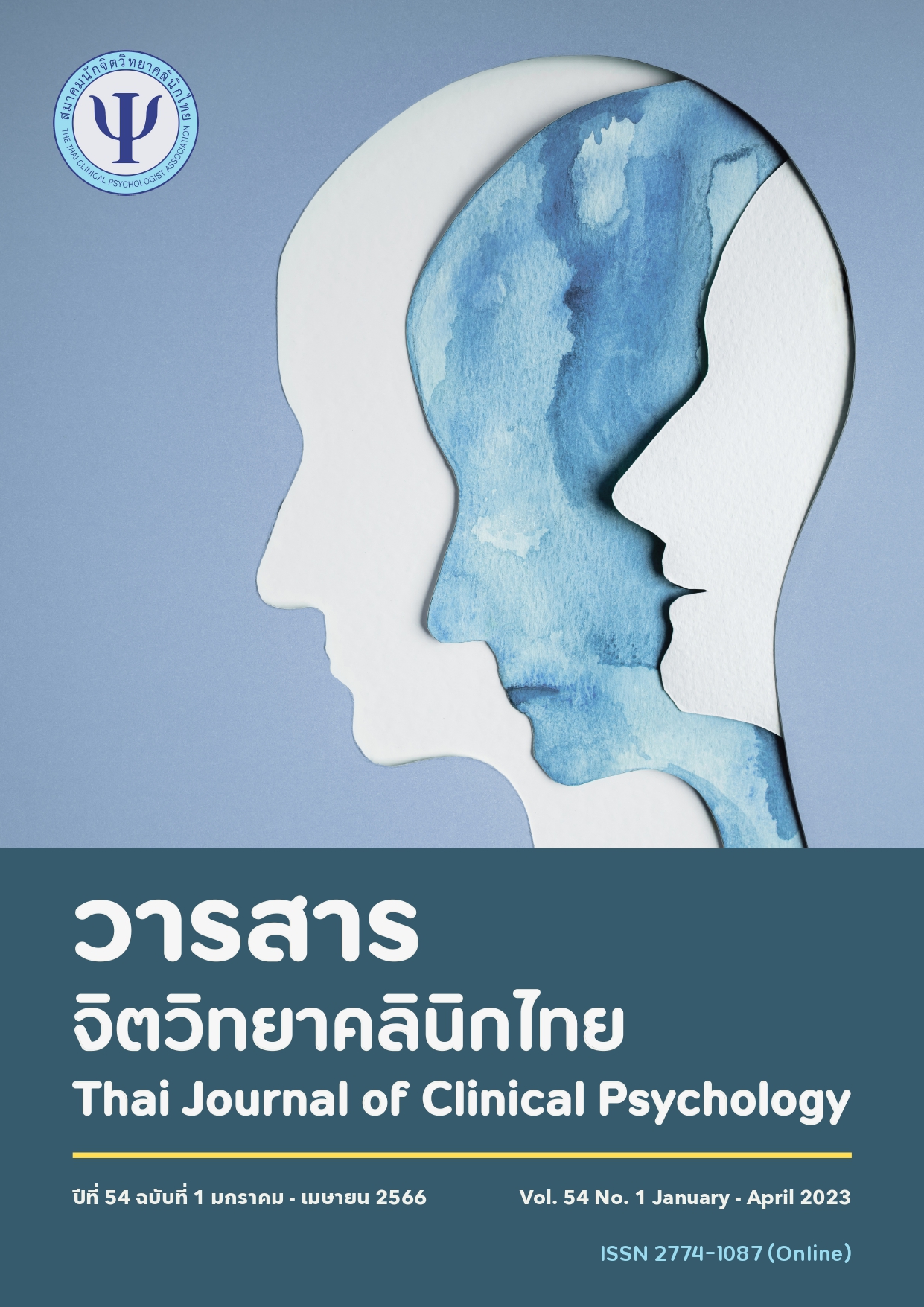การศึกษาเบื้องต้น: ความสัมพันธ์ระหว่างกิจกรรมทางกายและกระบวนการรู้คิดในผู้ป่วยโรคจิตเภทในสถานการณ์การแพร่ระบาดของโรคติดเชื้อไวรัสโคโรนา
Main Article Content
บทคัดย่อ
วัตถุประสงค์ เพื่อศึกษาความสัมพันธ์ระหว่างกิจกรรมทางกายและกระบวนการรู้คิดในผู้ป่วยโรคจิตเภทในสถานการณ์การแพร่ระบาดของโรคติดเชื้อไวรัสโคโรนา (โควิด-19) วัสดุและวิธีการ เป็นการศึกษาเบื้องต้นเชิงพรรณนาแบบสำรวจภาคตัดขวาง เก็บข้อมูลช่วงระหว่างเดือนมีนาคมถึงสิงหาคม ปี พ.ศ. 2564 ในผู้ป่วยโรคจิตเภท อายุ 18-50 ปีที่เข้ารับการรักษาในหน่วยตรวจโรคจิตเวชศาสตร์ โรงพยาบาลศิริราช จำนวน 48 คน คัดเลือกผู้เข้าร่วมศึกษาด้วยวิธีสุ่มแบบเฉพาะเจาะจง เข้าสัมภาษณ์ข้อมูลส่วนบุคคล ประเมินกิจกรรมทางกาย และประเมินพุทธิปัญญา (MoCA; Montreal Cognitive Assessment) วิเคราะห์ข้อมูลโดยใช้สถิติเชิงพรรณนา การทดสอบการกระจายของข้อมูลโดยใช้สถิติ Shapiro-Wilk test และทดสอบสมมติฐานโดยใช้สถิติ Spearman’s rank correlation ผลการศึกษา พบว่า ผู้เข้าร่วมศึกษามีกิจกรรมทางกายแบบการเดินทางมากที่สุด (ร้อยละ 40) และแบบการทำงานน้อยที่สุด (ร้อยละ 27.14) กิจกรรมทางกายที่ไม่เพียงพอในผู้ป่วย ร้อยละ 27.08 และภาวะการรู้คิดบกพร่องร้อยละ 60.4 กิจกรรมทางกายแบบนันทนาการโดยรวมมีความสัมพันธ์กับกระบวนการรู้คิดอย่างมีนัยสำคัญทางสถิติ (r = .35) แต่กิจกรรมทางกายโดยรวม กิจกรรมทางกายแบบทำงาน กิจกรรมทางกายแบบเดินทางไม่มีความสัมพันธ์กับกระบวนการรู้คิด สรุป ผลการศึกษาเบื้องต้นแสดงให้เห็นว่า เฉพาะกิจกรรมทางกายแบบนันทนาการโดยรวมมีความสัมพันธ์กับกระบวนการรู้คิด อย่างไรก็ตาม ควรมีการศึกษาเพิ่มเติมเพื่อยืนยันข้อสรุปดังกล่าวก่อนนำไปใช้ทางเวชปฏิบัติ
Article Details

อนุญาตภายใต้เงื่อนไข Creative Commons Attribution-NonCommercial-NoDerivatives 4.0 International License.
เรื่องที่ลงตีพิมพ์ในวารสารจิตวิทยาคลินิกแล้วถือเป็นลิขสิทธิ์การเผยแพร่โดยวารสารจิตวิทยาคลินิกแต่เพียงผู้เดียว การตีพิมพ์หรือเผยแพร่ซ้ำในที่อื่นต้องได้รับอนุญาตจากกองบรรณาธิการวารสารฯ
เอกสารอ้างอิง
Abdul Rashid, N. A., Nurjono, M., & Lee, J. (2019). Clinical determinants of physical activity and sedentary behaviour in individuals with schizophrenia. Asian Journal of Psychiatry. https://doi.org/10.1016/j.ajp.2019.10.004
Aekplakorn W, editor. (2009). The report of physical examination in Thai population in 2008-9. The Graphico Systems. (in Thai).
Altamura, A. C., Serati, M., & Buoli, M. (2015). Is duration of illness really influencing outcome in major psychoses?. Nordic Journal of Psychiatry, 69(6), 1685–1699. https://doi.org/10.3109/08039488.2014.990919
Ang, M. S., Nurjono, M., & Lee, J. (2019). The effects of clinical illness severity and physical activity on health-related quality of life in schizophrenia. Quality of Life Research. https://doi.org/10.1007/s11136-019-02126-8
Arunpongpaisal, S. & Sangsirilak, A. (2013). Using MoCA-Thai to evaluate cognitive impairment in patients with schizophrenia. Journal of the Medical Association of Thailand. 96(7), 860-5.
Daumit, G. L., Goldberg, R. W., Anthony, C., Dickerson, F., Brown, C. H., Kreyenbuhl, J., Wohlheiter, K., & Dixon, L. B (2005). Physical activity patterns in adults with severe mental illness. The Journal of Nervous and Mental Disease, 193(10), 641–646.
Department of mental health. (2019). Did you know? Ten percents of ASEAN population have mental problems. Retrieved October 20, 2019, from https://www.dmh.go.th/news-dmh/view.asp?id = 30011 (in Thai).
Ferrer-Unis, B., Ramos, M. A., Busquets, A., & Angulo-Barroso, R. (2022). Can exercise shape your brain? A review of aerobic exercise effects on cognitive function and neuro-physiological underpinning mechanism. AIMS Neuroscience, 9(2), 150-174.
Firth, J., Cotter, J., Elliott, R., French, P., & Yung, A. R. (2015). A systematic review and meta-analysis of exercise interventions in schizophrenia patients. Psychological Medicine, 45(07), 1343–1361. https://doi.org/10.1017/s0033291714003110
Firth, J., Stubbs, B., Rosenbaum, S., Vancampfort, D., Malchow, B., Schuch, F., Elliott, R., Nuechterlein, K. H., & Yung, A. R. (2016). Aerobic exercise improves cognitive functioning in people with schizophrenia: A systematic review and meta-analysis. Schizophrenia Bulletin, sbw115. https://doi.org/10.1093/schbul/sbw115
Firth, J., Rosenbaum, S., Stubbs, B., Gorczynski, P., Yung, A. R., & Vancampfort, D. (2016). Motivating factors and barriers towards exercise in severe mental illness: A systematic review and meta-analysis. Psychological Medicine, 46(14), 2869–2881. https://doi.org/10.1017/s0033291716001732
Füzéki, E., Groneberg, D. A., & Banzer, W. (2020). Physical activity during COVID-19 induced lockdown: Recommendations. Journal of Occupational Medicine and Toxicology, 15(1). https://doi.org/10.1186/s12995-020-00278-9
Gavin, B., Lyne, J., & McNicholas, F. (2020). Mental health and the COVID19 pandemic. Irish Journal of Psychological Medicine, 1–7. https://doi.org/10.1017/ipm.2020.72
Gökçe, E., Güneş, E., & Nalçaci, E. (2019). Effect of Exercise on Major Depressive Disorder and Schizophrenia: A BDNF Focused Approach. Noro psikiyatri arsivi, 56(4), 302–310. https://doi.org/10.29399/npa.23369
Harvey, P. D., Keefe, R. S. E., Eesley, C. E. ( 2017) . Kaplan & Sadock’s comprehensive textbook of psychiatry volume I tenth edition. Aptara, Inc.
Lubans, D., Richards, J., Hillman, C., Faulkner, G., Beauchamp, M., Nilsson, M., Kelly, P., Smith, J., Raine, L., & Biddle, S., (2016). Physical activity for cognitive and mental health in youth: A systematic review of mechanisms. Pediatrics, 138(3), e20161642
Nyboe, L., & Lund, H. (2012). Low levels of physical activity in patients with severe mental illness. Nordic journal of psychiatry, 67(1), 43–46. https://doi.org/10.3109/08039488.2012.675588
Ramking, N., Soonthornchaiya R. & Vuthiarpa S. (2018). The effect of a cognitive stimulation program on the cognitive function of older adults with mild cognitive impairment. Journal of nursing and health care, 36(2), 114-122 (in Thai).
Saqib, Z. A., Dai, J., Menhas, R., Mahmood, S., Karim, M., Sang, X., & Weng, Y. (2020). Physical activity is a medicine for non-communicable diseases: A survey study regarding the perception of physical activity impact on Health wellbeing. Risk Management and Healthcare Policy,13, 2949–2962. https://doi.org/10.2147/rmhp.s280339
Shahidi, S. H., Stewart Williams, J., & Hassani, F. (2020). Physical activity during COVID‐19 quarantine. Acta Paediatrica. https://doi.org/10.1111/apa.15420
Stubbs, B., Firth, J., Berry, A., Schuch, F. B., Rosenbaum, S., Gaughran, F., Veronesse, N., Williams, J., Craig, T., Yung, A. R., & Vancampfort, D. (2016). How much physical activity do people with schizophrenia engage in? A systematic review, comparative meta-analysis and meta-regression. Schizophrenia Research, 176(2-3), 431–440
Tangwongchai, S., Charernboon, T., Phanasathit, M., Akkayagorn, L., Hemrungrojn, S., Phanthumchinda,L., & Nasreddine, Z. (2009). The validity of Thai version of the Montreal cognitive assessment (MoCA-T). Dementia & Neuropsychologia, 3(2), 136-178.
Thongsai, S. (2015). Effectively caring schizophrenic patients in Thailand. Journal of Nursing division, 42(3), 159-165 (in Thai).
Visuthipanich, V. (2016). Psychometric Testing of GPAQ among the Thai Population. Thai Pharmaceutical and Health Science Journal, 11, 144-152. (in Thai).
Wangruangsatit, Y., & Wangruangsatit, R. (2021). The Prevalence and associated risk factors of mild cognitive impairment in Elderly people in the elderly club: The prevalence and associated risk factors of mild cognitive impairment. Buddhachinaraj Medical Journal, 38(1), 34-47.
World Health Organization. (2019). Global strategy on diet, physical activity and health. Retrieved October 28, 2019, from https://www.who.int/dietphysicalactivity/pa/en/
Wu, C., Dagg, P., & Molgat, C. (2014). A pilot study to measure cognitive impairment in patients with severe schizophrenia with the Montreal cognitive assessment (MoCA). Schizophrenia Research, 158(1-3), 151–155.


